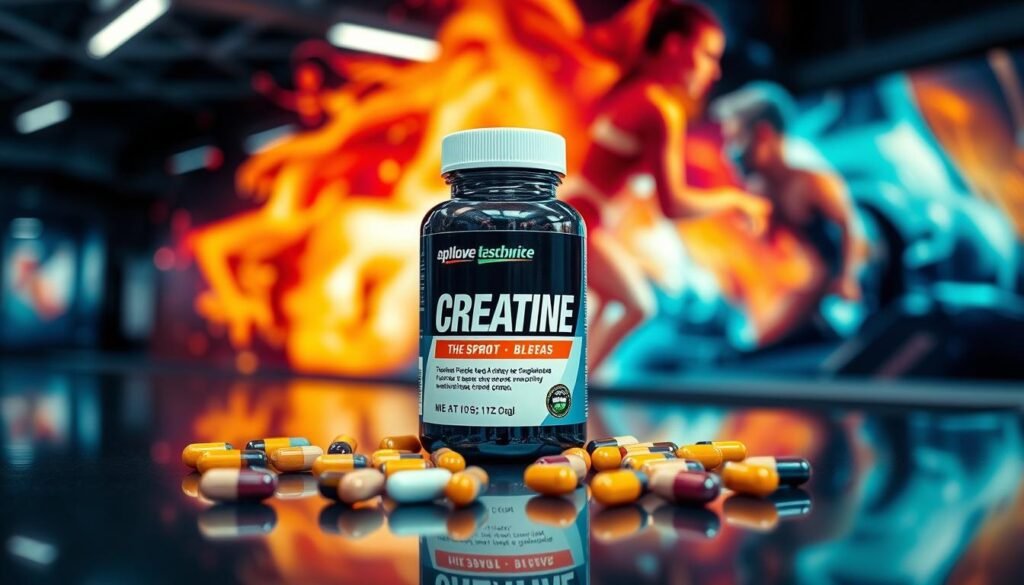Creatine is a popular supplement for athletes and fitness buffs. It enhances exercise performance and muscle growth. With over 200 years of research, creatine is one of the most scientifically supported supplements.
Creatine’s main job is to boost energy production in cells. It helps replenish ATP, the body’s basic energy unit. This leads to better high-intensity exercise performance.
As a result, you can push harder during workouts. You’ll also recover faster, helping you achieve your fitness goals more quickly.
Table of Contents
ToggleKey Takeaways
- Creatine is a natural supplement that can boost athletic performance and muscle growth
- Creatine helps replenish ATP, the body’s primary energy source, leading to improved exercise capacity
- Creatine has been shown to increase strength, lean muscle mass, and exercise recovery
- Creatine supplements are available in powder or pill form, each with their own advantages
- Creatine is considered a safe and effective supplement for most healthy individuals
What is Creatine?
Creatine is a natural compound vital for muscle energy production. It’s found in skeletal muscles and the brain. Our body makes about 1 gram of creatine daily.
Creatine’s Role in Energy Production
Creatine helps produce adenosine triphosphate (ATP), the basic energy form in our cells. It replenishes ATP in muscles, enabling longer high-intensity exercise. This benefits activities like weightlifting, sprinting, and high-intensity interval training.
Studies show oral creatine supplements can boost strength and muscle size. They enhance performance in high-intensity intermittent activities. Creatine may also help reduce dehydration and muscle injuries in athletes.
“Creatine is the single most effective supplement for adding lean muscle mass.” – Examine.com
Benefits of Creatine Supplementation
Improved High-Intensity Exercise Performance
Creatine is a top supplement for boosting high-intensity exercise performance. Studies show it can improve performance by 1-15% on average. This means faster sprints, more cycling power, and higher jumps.
Creatine can speed up gains in strength, power, and sprinting. These benefits usually take months or years to achieve through training alone. With creatine, you can see results faster.
“Studies show that creatine helps increase muscle growth in individuals between 18 to 30 years old.”
Creatine is popular among athletes in power sports like bodybuilding, football, hockey, and wrestling. It enhances muscle performance in high-intensity exercises. The International Olympic Committee (IOC) and NCAA allow athletes to use creatine supplements.
Creatine for Strength and Power Exercises
Creatine is a top supplement for boosting strength and power exercises. It can significantly improve maximum strength, muscle growth, and exercise performance when combined with resistance training.
One study showed a 15% increase in 1-rep max bicep curl weight after 6 weeks. Creatine also enhances explosive power and repetitions for exercises like the bench press.
The benefits of creatine for strength and power exercises are well-known. It has been linked to several improvements.
- Increased maximum strength in exercises like the bicep curl, squat, and bench press
- Improved explosive power and endurance for high-intensity exercises
- Enhanced muscle growth and fat-free mass gains when combined with resistance training
Creatine helps maintain higher phosphocreatine levels in muscles. This allows for faster ATP replenishment during intense, short-duration activities.
“Creatine supplementation has consistently shown to increase strength, fat-free mass, and muscle morphology in conjunction with heavy resistance training.”
Athletes and fitness enthusiasts can boost their creatine strength and muscle gains. Adding creatine to a solid training and nutrition plan can be a game-changer.
Creatine and Muscle Growth
Creatine boosts exercise performance and promotes muscle growth. Studies show that regular creatine use with strength training increases muscle mass and size. It’s a powerful aid for building strength and muscle.
Enhancing Muscle Gain
One study found a 20% increase in testosterone levels with creatine use. This hormonal boost may help build muscle. Creatine also leads to more muscle growth in arms, legs, and trunk for resistance-trained men.
Creatine monohydrate can increase strength in just two weeks. It does this without raising muscle damage markers. This suggests creatine helps build muscle faster and more effectively.
| Creatine Supplementation and Muscle Gain | Findings |
|---|---|
| Muscle Hypertrophy | Greater muscle growth in upper limbs, lower limbs, and trunk in resistance-trained men |
| Strength Increase | Strength gains in as little as 2 weeks without reducing muscle damage markers |
| Testosterone Levels | 20% increase in creatine group vs. 5% in non-creatine group |
These findings show creatine’s strong muscle-building effects. It’s a valuable tool for bodybuilders, strength athletes, and anyone looking to maximize muscle growth and performance.

Creatine Pills
Creatine monohydrate is a popular and well-researched supplement. Studies confirm its safety and effectiveness. It can boost muscle creatine stores by 10-40%, depending on your body’s response.
A loading phase helps maximize creatine benefits. Take 20-25 grams daily for 5-7 days to rapidly increase muscle creatine. After loading, maintain with 3-5 grams per day.
For convenience, Animal Creatine Chews offer an easy way to consume creatine. These chews support performance and recovery without needing water or measuring powder.
Classic Creatine Monohydrate Capsules with BioFit™ is another popular option. Each serving contains 5,000 mg creatine monohydrate and 20 mg BioFit™ Bacillus Coagulans. This probiotic may improve digestion and nutrient absorption.
The recommended loading phase is 6 capsules 4 times daily for 5 days. Maintain with 6 capsules after workouts or on rest days.
Stay hydrated and eat enough carbs to support muscle creatine uptake. Always consult a healthcare professional before starting new supplements. This is especially important if you have medical conditions or take medication.
“Creatine supplementation has been shown to significantly improve high-intensity exercise performance and increase lean muscle mass when combined with resistance training.”
Dosage and Loading Phase
Optimal creatine use requires understanding dosage and loading phase. The typical recommended dose is 3-5 grams daily. A loading phase can provide a quicker boost in muscle creatine content.
The loading phase involves 20-25 grams of creatine daily for 5-7 days. This is split into 4-5 smaller doses. It can increase intramuscular creatine levels by 10-44% compared to standard dosing.
After loading, a 3-5 gram daily maintenance dose sustains elevated creatine levels. Taking creatine with a meal can enhance its absorption and use by muscles.
Optimizing Creatine Levels
Consuming 100 grams of carbs with 5 grams of creatine can boost muscle creatine content by 60%. Once muscle saturation is achieved, creatine levels stay elevated for 4-6 weeks.
This provides flexibility if you miss a day or two of supplementation. Creatine supplementation consistently improves strength, power, and exercise performance, regardless of dosing strategy.
“Creatine loading may lead to significant increases in muscle mass when combined with resistance training.”
Safety and Side Effects
Creatine supplements are generally safe for long-term use in healthy individuals. Research spanning 200 years hasn’t found significant negative effects. Creatine supplements have shown to be beneficial and safe.
The International Society of Sports Nutrition (ISSN) considers creatine one of the most beneficial sports supplements. It can increase muscle stores, improve exercise performance, and aid in fat loss. These benefits come without causing dehydration or cramping.
However, safety isn’t established for pregnant or breastfeeding individuals. It’s also unclear for those with diabetes, kidney disease, or liver disease. Always consult a healthcare provider before starting creatine.
Creatine’s Safety Profile
Research shows creatine is safe, even with long-term use and high doses. Studies indicate no negative effects on liver or kidneys in healthy individuals.
Creatine may offer additional health benefits. It might reduce inflammatory bowel disease severity and aid in body fat reduction. These benefits apply to both younger and older adults.
High doses can sometimes cause digestive issues like diarrhea. However, creatine’s overall safety profile is favorable. It’s especially beneficial for healthy individuals seeking to enhance performance or support general health.
Creatine for Endurance Exercise
Creatine is known for boosting short, high-intensity exercises. Its role in endurance activities is less direct. Endurance exercises rely less on rapid ATP regeneration, where creatine excels.
Research shows creatine can still benefit endurance athletes indirectly. It may help athletes complete more high-intensity intervals during workouts. This can lead to improved overall fitness and endurance performance.
A 2021 review highlighted alternative creatine forms for enhancing performance and body composition. Studies show oral creatine can influence muscle torque during repeated maximal exercises. This is crucial for aerobic exercise and high-intensity intervals.
Creatine may help endurance athletes who include sprinting or strength training. It can enhance their ability to perform these high-intensity components. This contributes to overall endurance performance.
“Creatine monohydrate supplementation significantly increased cycling power output in well-trained triathletes leading to improved performance during cycling segments of a triathlon.”
Creatine’s direct impact on endurance may be less noticeable. However, it supports intense training sessions and recovery. This can provide a valuable edge for endurance athletes.

Types of Creatine Supplements
Creatine is a widely studied dietary supplement. It can boost muscle creatine content by up to 40%. This leads to significant performance and recovery benefits.
Several types of creatine supplements are available. Creatine monohydrate is the most researched and recommended form.
Choosing the Right Form
Creatine monohydrate is the gold standard. It’s 90% creatine by weight. Hundreds of studies support its safety and effectiveness.
It improves exercise capacity, muscle growth, and strength gains. Creatine monohydrate is also the most affordable option.
Other forms include creatine ethyl ester and creatine hydrochloride. These claim improved absorption or stability. However, research on these alternatives is limited.
They haven’t shown to be more effective than creatine monohydrate. When choosing, opt for a reputable brand of creatine monohydrate.
This ensures you get a proven, effective, and safe supplement. It will support your fitness and performance goals.
“Creatine monohydrate is the most widely used and researched form, promoting muscle gain, increased strength, and exercise capacity.”
Combining Creatine with Other Supplements
Creatine can be combined with other supplements for enhanced benefits. Some studies suggest pairing creatine with specific compounds may boost its effectiveness. However, research on synergistic effects is still ongoing.
Creatine and Protein or Carbohydrates
Taking creatine with protein or carbs may improve muscle cell uptake. This combo has shown to enhance exercise capacity and muscle growth. More research is needed to determine the full extent of these benefits.
Creatine and Beta-Alanine
Creatine and beta-alanine might work well together. Beta-alanine helps increase carnosine, which is crucial for muscle endurance. Some studies show this pair may improve high-intensity exercise performance more than either supplement alone.
Creatine and Whey Protein
Combining creatine with whey protein may boost muscle building and recovery. Whey protein is rich in amino acids. More research is needed to understand the specific mechanisms and optimal dosages.
The potential benefits of combining creatine with other supplements are promising. However, research in this area is still developing. Always consult a healthcare professional before starting any new supplement regimen.
| Supplement Combination | Potential Benefits | Research Status |
|---|---|---|
| Creatine + Protein or Carbohydrates | Improved creatine uptake, exercise capacity, and muscle growth | Promising, but more research needed |
| Creatine + Beta-Alanine | Enhanced high-intensity exercise performance | Positive findings, but more studies required |
| Creatine + Whey Protein | Increased muscle building and recovery | Potential benefits, but further research needed |
Talk to a healthcare expert before using creatine combination supplements. Proper dosage and timing are key. Monitor any side effects to maximize benefits and minimize risks.
Conclusion
Creatine is a well-researched supplement that boosts exercise performance, strength, and muscle growth. Creatine monohydrate is the most proven form. It can enhance exercise capacity by up to 15% on average.
Creatine increases the muscles’ ability to produce ATP, the body’s main energy source. It may improve training capacity for endurance athletes. A loading phase followed by maintenance dosing is recommended.
Creatine is generally safe for long-term use in healthy people. However, consult a healthcare provider before use, especially if you have medical conditions.
The creatine benefits summary includes better exercise performance, increased strength, and muscle growth. It may also enhance cognitive function. For supplement recommendations, creatine monohydrate is the top choice for its proven effectiveness and safety.
FAQ
What is creatine and how does it work?
Creatine is a popular supplement that boosts exercise performance. It replenishes ATP, the basic energy form in cells. This leads to better high-intensity exercise capacity.
What are the benefits of creatine supplementation?
Creatine enhances high-intensity exercise performance and improves strength and power. When combined with exercise, it supports muscle growth.
How does creatine improve strength and power exercises?
Creatine can increase maximum strength in exercises like bicep curls, squats, and bench presses. It improves explosive power and helps complete more repetitions.
Can creatine help build muscle?
Yes, regular creatine intake combined with weightlifting can increase muscle growth. It may do this by boosting testosterone levels.
What is the most common and effective form of creatine?
Creatine monohydrate is the most common and well-researched form. Hundreds of studies support its safety and effectiveness.
How should creatine be dosed?
The typical dose is 3-5 grams per day. A loading phase of 20-25 grams daily for 5-7 days can rapidly increase muscle creatine stores. After that, take a maintenance dose of 3-5 grams daily.
Is creatine safe for long-term use?
Creatine is generally safe for long-term use in healthy individuals. However, consult a healthcare provider before taking creatine, especially if you have medical conditions.
How does creatine affect endurance exercise?
Creatine provides less direct benefit for low-intensity endurance exercise. However, it may improve training capacity for endurance athletes. It can enhance their ability to perform high-intensity intervals or strength training.
What are the different types of creatine supplements?
Several types of creatine supplements exist. However, creatine monohydrate is the most studied and proven form. It’s the recommended and cost-effective choice.
Can creatine be combined with other supplements?
Creatine can be combined with protein or carbohydrates to enhance absorption and use. It may have synergistic benefits when stacked with muscle-building and performance-enhancing supplements.

